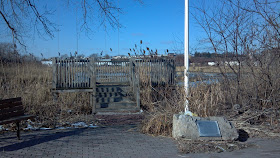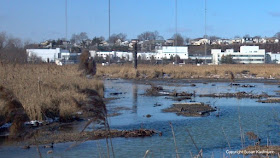 I was reminded of this advice on a recent roam around the Meadowlands. After finding DeKorte Park was closed, I headed back toward Route 3, making a quick detour down Clay Avenue in Lyndhurst to check one of Ivan's little birding spots. There's a small marshy pond amid the office buildings and warehouses, with some of the usual detritus you expect in an area that's gone between natural and industrialized (and sometimes even dumped on) over the past two centuries. While it rarely seems to produce much in terms of avian life, I was in the area, so what the heck.
I was reminded of this advice on a recent roam around the Meadowlands. After finding DeKorte Park was closed, I headed back toward Route 3, making a quick detour down Clay Avenue in Lyndhurst to check one of Ivan's little birding spots. There's a small marshy pond amid the office buildings and warehouses, with some of the usual detritus you expect in an area that's gone between natural and industrialized (and sometimes even dumped on) over the past two centuries. While it rarely seems to produce much in terms of avian life, I was in the area, so what the heck.Usually we approach from the north and pull into an adjoining parking lot. This time I was coming from the south and found something I hadn't noticed before. Next to the small viewing platform was a plaque on a rock, or as it's known to us, potential Hidden New Jersey gold. Even better, there was lots of text on it, and a line drawing of a woman. Was she the person who'd fought for the preservation of this little oasis of wetland among the macadam and brick?
No, she wasn't, but as it turns out, she'd preserved much more than that. Tessie McNamara was the heroine of the 1917 Kingsland Explosion, and our little bird spot was once the site of the Canadian Car and Foundry munitions plant. As the plaque tells it, Tessie was the company's first female employee and the plant's switchboard operator. When a fire broke out in the factory on January 11, 1917, the 25 year old bravely stayed on duty, alerting employees in all 40 buildings in the complex as well as the fire and police departments. "My first thought was to save the lives of the 1700 men in the buildings," the plaque quotes her as saying. "While making my calls, the first shell struck the building and passed about five feet from where I was sitting. About a dozen buildings were now on fire, and I had completed all calls. I started to leave the building without a coat, but I couldn't walk. My courage left me and the arriving firemen picked me up, wrapped a big coat around me and rushed for the gate."
What the plaque doesn't say is that the Kingsland Explosion was most likely an act of sabotage perpetrated by German spies. The United States hadn't yet entered World War I but was, nonetheless, supplying munitions to Great Britain and Russia. Canadian Car and Foundry produced 3 million shells per month, making it a suitable target. Security was tight, so to get entry into the factory without raising suspicion, the saboteurs got jobs with the company and planned to make damage with materials they could find within the building. It wasn't exactly a difficult task, it seems: the manufacturing process used either alcohol or gasoline to clean out the shells, so several workers had flammable liquids at their workbenches.
During the incident investigation, witnesses noted that the blaze had started at the workstation of one employee who'd seemed especially nervous that day. He reportedly had more that the customary number of cleaning rags and had spilled his pan of alcohol just before the fire broke out. Before the authorities could question him, however, he disappeared.
 |
| Just above the center of this photo, you can see a smokestack, the last visible portion of the factory. |
Today, very little is left of the Canadian Car and Foundry complex -- just a portion of a smokestack sticking out of the marshy pond. Mallards and coots swam past it on my latest visit, unaware of the site's violent past. As for Tessie McNamara, she was the Captain Sully Sullenberger of her day, thrust into the public consciousness for using her vocational skills to save others. She gained momentary fame as newspapers around the country hailed her heroism and levelheadedness. The National Special Aid Society, an emergency preparedness organization founded on the eve of World War I also gave her a monetary award. Preferring a quiet life, she quickly shunned the spotlight and presumably found another office job. She later moved from Lyndhurst to East Rutherford, where she died in 1971. I wonder if she ever returned to the scene of her heroism.
No comments:
Post a Comment
Note: Only a member of this blog may post a comment.